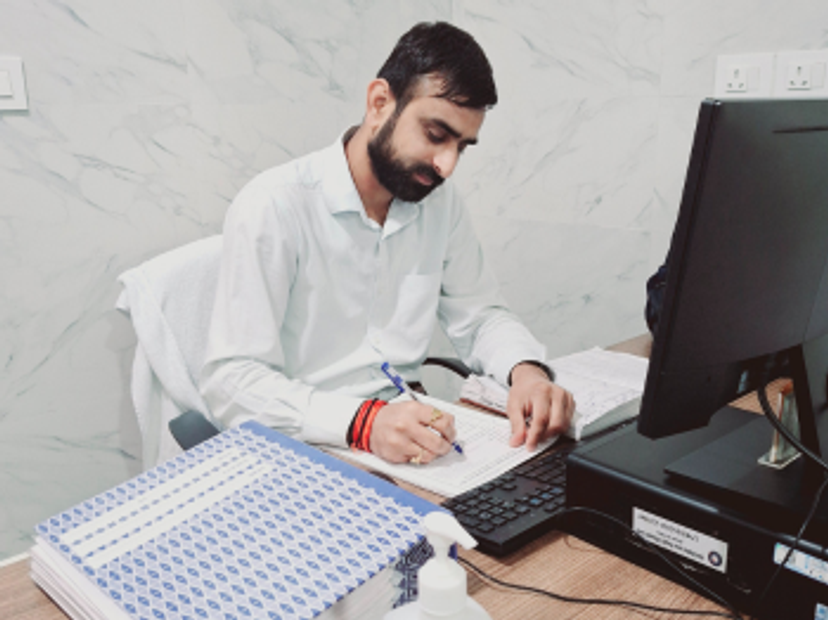24 hours in the life of a scientific assistant in India
10 Dec 2024
Kuldeep Singh Chauhan, Homi Bhabha Cancer Hospital & Research Centre, India
In this guest blog, submitted as part of the global CLINICAL24 conversation, Kuldeep Singh Chauhan, tells us about his role as a scientific assistant in Mohali Punjab State, India. Discover Chuhan's extensive daily responsibilities in the Cancer Registry Unit and how technology helps him to achieve his goals.
About my role as a scientific assistant in India
Currently, I am working as a scientific assistant in the hospital-based Cancer Registry Unit under the Department of Preventive Oncology and Centre for Cancer Epidemiology. My workplace is Homi Bhabha Cancer Hospital & Research Centre (a unit of Tata Memorial Centre, Mumbai, DAE GOI), New Chandigarh, Mohali Punjab State India.
My present job role consists of case abstraction through electronic medical records of the hospital for the collection of the demographic as well as the clinical information of the patient:
- Coding the cases as per ICD-O3 Rules
- Staging the Cases as per AJCC 8th Edition and grouping them for extent of disease as per SEER Staging Manual
- Data entry in Canreg5 software
- Quality check of the data as per existing rules and technical tools available from IARC-WHO
- Data analysis using Canreg5 software as well as by using advanced excel tools
- Report writing
- Research paper/manuscript writing
- Responsible for communicating with editorial board of the concerned journal and peer review process for research articles publications
- Writing research proposals
- Preparing the data as per need of the clinicians
- Providing technical and scientific support to PBCR Staff as assigned by senior authorities as well as to co-ordinate with the hospital administration for any potential work assigned by time to time.
- Coordination with CCE-TMC, Mumbai team for data submission to various national and international agencies.
- Data quality control for different population-based cancer registries.
I have also served as a Resource Person in the "Setting up Cancer Registry" Workshop organized by IARC-WHO Regional Cancer Registration Hub, CCE-TMC, Mumbai during 2020 and 2021 as well as trained various participants from different Indian Cancer registered via in person/virtual training programs in 2022 and 2023."
What does a typical day look like for you?
I carry out all necessary work in epidemiology as per our work schedule which includes case abstraction, coding of the cases as per ICD-O3 rules and staging as per AJCC 8th Edition, data consistency checks, data analysis as well as report writing in terms of leading cancer sites in our hospital.
I also assist Pathologist, Medical Oncologist, Radiation Oncologist and Senior Epidemiologist for any potential help required in data preparation and data analysis. I provide scientific and technical support to the other team members as per their requirements.
In addition to my daily routine, I also provide necessary help to the people with cancer by guiding them in a correct manner related to the requirement of tests and related investigations to be done for correct diagnosis and effective management of the disease.
My biggest challenges as a scientific assistant
The challenges face in our daily routines are very limited, sometimes we face problems in coding of the cases as there are several coding rules which sometimes contradict with the opinion of Pathologist, so it’s really challenging to choose the correct code. Sometimes, we face a problem in deciding the primary site in the presence of very limited clinical details, so we discuss these cases with clinicians from onco-pathology, medical oncology, radiation oncology, surgical oncology as well as radio-diagnosis.
How technology supports my work as a scientific assistant
Technology has helped us very much in our daily life which includes coding of the cases from manual to digital forms available in pdf and by using the search function, importation of demographic data from excel to Canreg5 software. This is done with the help of a programmer which makes our job easy and smooth and we don’t have any requirement for manual data entry for the demographic section. Due to this technological support, we are able to focus more on tumor and treatment related information while abstracting the data.
It would be even more beneficial if our software could directly fetch most of the variables from the electronic medical records itself, so that it only has to be checked for accuracy. There may be a probability of saving time, and we could get more data with accuracy by means of expert staff in epidemiology.
Further, I am really thankful to Dr. Vandita and Dr. Tapas for the guidance and support in getting administrative permission from the institute. I also thank Dr. Ashsih Gulia - Director HBCH & RC for providing their guidance and support during this journey. I am heartily thankful to my mentor Dr. Atul Budukh for continuous support and guidance in my scientific career.
Note: Mr. Kuldeep Singh Chauhan has also been awarded an International fellowship in Cancer Registration and Certified from IARC-WHO during 13-15 July, 2021.
